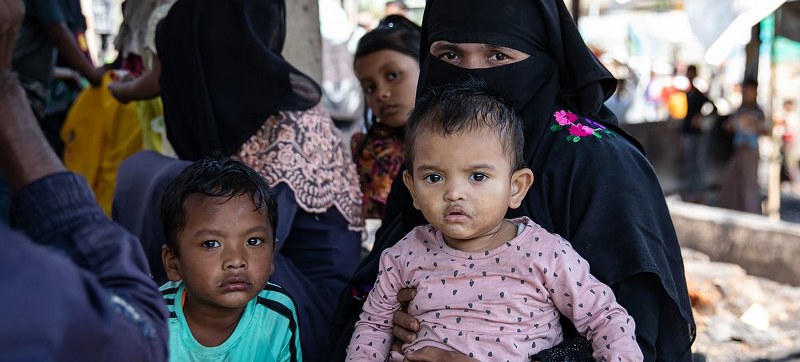Rohingya refugees in Bangladesh need urgent support as crises multiply: UNHCR

The UN refugee agency, UNHCR, is calling on the international community to renew its commitment to the nearly one million Rohingya refugees who have fled persecution in Myanmar for neighbouring Bangladesh.
This week marks six years since over 700,000 mostly-Muslim Rohingya men, women, and children joined the hundreds of thousands of others already sheltering in Bangladesh, following a brutal crackdown by security forces in Myanmar.
As humanitarian conditions in the world’s largest refugee settlement worsen, however, the challenges surrounding this protracted crisis continue to increase.
Funds running out
Steep declines in funding are forcing humanitarian actors to focus on only the most critical of humanitarian needs, said UNHCR.
This – for the first time - has led to a reduction of food assistance, raising concerns over consequences such as rising rates of malnutrition, child labour, and gender-based violence.
“In Bangladesh, funding shortfalls are already adversely affecting the wellbeing of nearly one million Rohingya refugees. Any further cuts to the Rohingya response will severely impact access to food, shelter materials, cooking fuels, sanitation facilities, and livelihood activities,” said UNHCR in Bangladesh.
Sustainable return
A dignified and sustainable return to Myanmar remains the primary solution to the crisis, the refugee agency stressed. Many Rohingya refugees say they want to return to Myanmar but only when it is safe for them to do so voluntarily; and the international community must now renew its efforts to make that possible.
UNHCR is calling for access to education and vocational training for refugees. This will not only equip them for their eventual return to Myanmar, but also ensure their dignity, safety, and productivity while in Bangladesh.
While the UN remains ready to support a sustainable return of refugees, it is crucial that UNHCR and partners are provided unimpeded access to Rakhine State in Myanmar, so they can assist and monitor returns.
Until refugees can safely do so, they remain in camps off the coast of the Bay of Bengal, a region vulnerable to extreme weather events and the impacts of climate change.
As a result, UNHCR continues to prioritize a climate action strategy, advocating for weather-and fire-resistant shelter materials. The strategy can also save millions of dollars in maintenance and rebuilding costs.
Responsibility to act
With nearly one million Rohingya refugees within its borders, Bangladesh has demonstrated humanitarian commitments and a generosity that must be acknowledged through continued investment in both the refugee and host communities, the agency stressed.
International stakeholders will have a chance to boost support and commitments to the Rohingya at the Global Refugee Forum in Geneva in December.
As of mid-August, funding for the Joint Response Plan for the Rohingya Humanitarian Crisis totalled less than a third of its $876 million overall appeal.
“The Rohingya response is facing a severe funding crisis, illustrated by two recent cuts in food assistance. There is an urgent need to invest in collective efforts to allow Rohingya to become self-reliant as they cannot, and do not wish to, remain dependent on humanitarian aid,” said UNHCR Representative in Bangladesh Johannes van der Klaauw.



